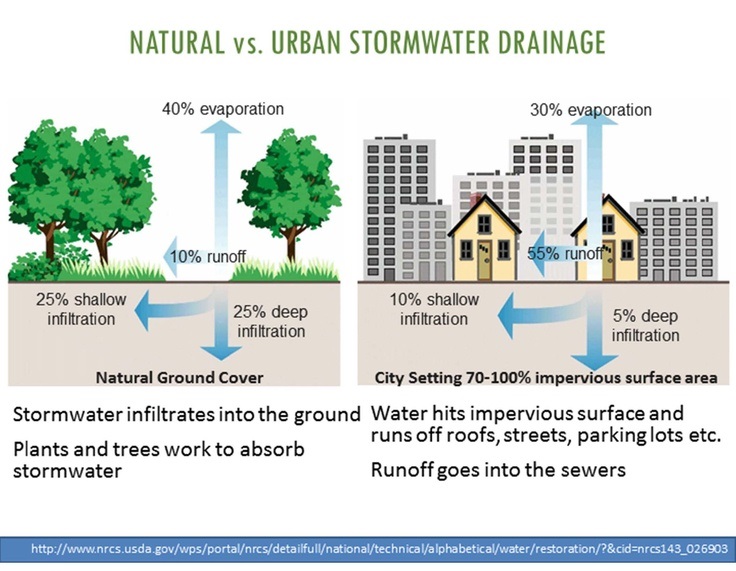Stormwater
Mississippi has been blessed with abundant water resources, such as beautiful creeks, streams, rivers, estuaries, bays, and coastal waters. As our state continues to grow, we face challenges to maintain clean water bodies. One of the challenges is managing storm water runoff and reducing polluted runoff.
Drainage Work on Private Property
The City of Ridgeland or a private property owner may occasionally determine a need to perform drainage work in order to protect the health, safety, and welfare of its owners. The above policy was adopted to address drainage work on private property.
If you are a property owner in Ridgeland seeking assistance from the City with drainage work, you may complete the above application request. The City of Ridgeland has adopted regulations pertaining to proper stormwater management: Ordinance for Stormwater Runoff, Illicit Discharges, and Illegal Connections.
What is Stormwater?

Stormwater is rainfall or melted snow that runs off impervious surfaces, such as rooftops, streets, sidewalks, and parking lots. Impervious, or hard, surfaces prevent the storm water from naturally soaking into the ground, where the soil would filter out pollutants. As it flows, storm water picks up pollutants from these surfaces.
Common pollutants include vehicle exhaust products, brake and tire dust, oil and grease, sediment, salt fertilizers and pesticides, pet waste, and litter. Because stormwater is untreated, these pollutants enter our waterways.
Regulatory Background
In 1987, Congress amended the Clean Water Act (CWA) to require implementation, in two phases, of a comprehensive national program for addressing storm water discharges.
The first phase of the program, commonly referred to as “Phase 1” was promulgated on November 16, 1990. (55 FR 47990). Phase 1 in 40 CFR Parts 9, 122, 123, and 124 requires National Pollutant Discharge Elimination System (NPDES) permits for storm water discharge form a large number of priority sources including municipal separate storm sewer systems (MS4s) generally serving populations of 100,000 or more and several categories of industrial activity, including construction sites that disturb five or more acres of land.
The second phase, the Stormwater Phase II Final Rule, is the next step in EPA’s effort to preserve, protect, and improve the Nation’s water resources from polluted stormwater runoff. The Phase II Final Rule was published in the Federal Register on December 8, 1999 (64 FR 68722). The Phase II program expands the Phase I program by requiring additional operators of MS4s in urbanized areas and operators of small construction sites, through the use of NPDES permits, to implement programs and practices to control polluted stormwater runoff.
The Phase II Rule defines a small MS4 stormwater management program as a program comprising six elements, that, when implemented in concert, are expected to result in significant reductions of pollutants discharged into receiving bodies.
MS4 Program Elements
The six MS4 program elements, termed “minimum control measures,” include:
Public Education and Outreach
Distribute educational materials and perform outreach to inform citizens about the impacts polluted storm water runoff discharges can have on water quality.
Public Participation / Involvement
Provide opportunities for citizens to participate in stormwater program development and implementation.
Illicit Discharge Detection and Elimination
Develop and implement a plan to detect and eliminate illicit discharges to the storm sewer system.
Construction Site Runoff Control
Develop, implement, and enforce an erosion and sediment control program for construction activities that disturb one or more acres of land.
Post-Construction Runoff Control
Develop, implement, and enforce a program to address discharges of post-construction stormwater runoff from new development and redevelopment areas.
Pollution Prevention / Good Housekeeping
Develop and implement a program with the goal of preventing or reducing pollutant runoff from municipal operations.
Environmental Protection Agency (EPA) Information
The following web site links contain information on storm water and general water quality:
- EPA’s Non Point Source Pollution Page
- Non Point Source Kids Page
- National Pollutant Discharge Elimination System
Green Infrastructure and Low Impact Development Strategies for Managing Storm Water Runoff
Resources:
- Low Impact Development Center: The Low Impact Development Center was established in 1998 to develop and provide information to individuals and organizations dedicated to protecting the environment and our water resources through proper site design techniques that replicate pre-existing hydrologic site conditions.
- Cherrywood Lane Complete and Green Street Project [pdf]
The Cherrywood Lane Complete and Green Street project design report was prepared by the Low Impact Development Center. It serves to provide a clear path for transforming a too-wide street into one that better serves multiple modes of transportation, minimizes paved surfaces, and optimizes stormwater management. This report can be used by concerned citizens, developers, builders, city staff and elected officials to help guide and inspire innovative solutions in development and redevelopment projects within the city. - Environmental Protection Agency (EPA) Green Infrastructure
- American Society of Landscape Architects (ASLA) Green Infrastructure
- Residential Green Infrastructure Guide [pdf]
- Green Infrastructure Fact Sheets (Source: City of Lancaster Green Infrastructure Plan)
For more information about stormwater, contact Cynthia James, Drainage Engineer, at 601.853.2027.





